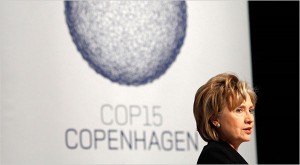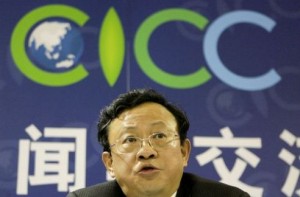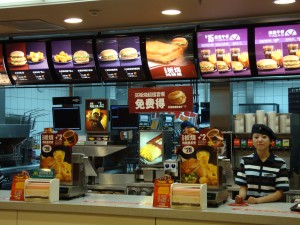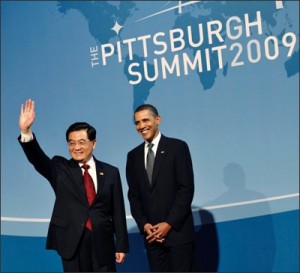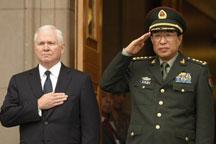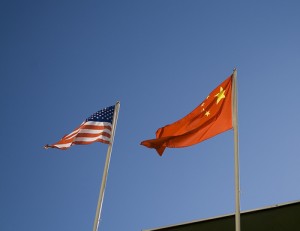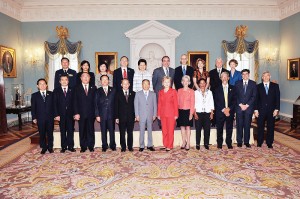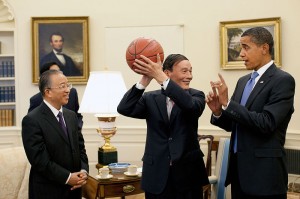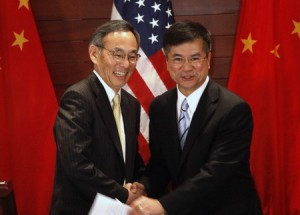The NY Times Overreacts to U.S. Arms Sales to Taiwan
In yesterday’s New York Times, Helene Cooper argued that the Obama Administration’s recent announcement of over 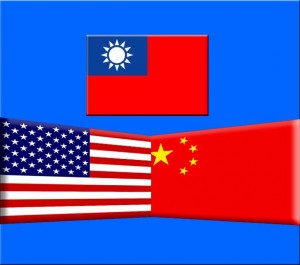 $6 billion in arms sales to Taiwan shows a “new toughness” toward Beijing and perhaps even a “fundamentally new direction” in the Administration’s China policy. But, by focusing on the arms sales, Ms. Cooper overemphasizes the event. U.S. arms sales to Taiwan are far from novel or tough, and some may argue, periodically required under U.S. law.
$6 billion in arms sales to Taiwan shows a “new toughness” toward Beijing and perhaps even a “fundamentally new direction” in the Administration’s China policy. But, by focusing on the arms sales, Ms. Cooper overemphasizes the event. U.S. arms sales to Taiwan are far from novel or tough, and some may argue, periodically required under U.S. law.
Similarly, Beijing’s angry reaction was predictable. In fact, for each prior Administration’s arms sales to Taiwan, the Chinese government has responded in much the same way: postponement of military-to-military meetings, issue formal protests with U.S. officials, and saber-rattling for the domestic consumption. However, Beijing’s recent threat of sanctions against U.S. companies involved with the arms sales is new and serious. But this is more a reflection of China’s growing confidence and less a reflection of a changed or “tough” U.S. policy toward China.
Why Does China Care so Much about Taiwan? Isn’t it a Separate Country?
Nope, scrap that vision from your mind. Taiwan is not a separate country, at least not in the eyes of the Chinese, Taiwanese or U.S. governments. The People’s Republic of China (a.k.a. the mainland) views Taiwan (a.k.a. “The Republic of China”) as a renegade province and any relations between Taiwan and other countries is viewed as interference in the mainland’s domestic affairs. While Taiwan has largely developed as an independent society, it agrees with the mainland’s assessment that there is only “one China.” The Taiwanese government has never called for independence and the Kuo Min Tang party (pronounced Gwo min-dang and a.k.a. “the Nationalists” or KMT), which has ruled Taiwan for most of Taiwan’s separate existence, also espouses the view of “one China” and that eventually, the mainland and Taiwan will reunite. The difference is who rules this reunited China. For Taiwan, it’s the KMT; for the mainland, the Chinese Communist Party (CCP).
All of this stems from World War II. After the War ended in 1945, the KMT and the CCP resumed their civil war, a civil war that was put on hold to fight the Japanese invasion from 1937 to 1945. By 1949, the CCP’s victory was certain and the KMT government fled to the province of Taiwan to continue the Republic of China.
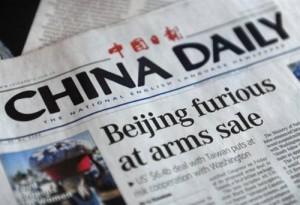 Thus began the baffling existence of two Chinas – the communist People’s Republic of China on the mainland and the KMT’s Republic of China on Taiwan. Each China claimed that it was the “official” and “rightful” China and the other a mere province; each forced the international community to recognize only one China – either China on the mainland or China on Taiwan – hence the birth of the “one China” policy.
Thus began the baffling existence of two Chinas – the communist People’s Republic of China on the mainland and the KMT’s Republic of China on Taiwan. Each China claimed that it was the “official” and “rightful” China and the other a mere province; each forced the international community to recognize only one China – either China on the mainland or China on Taiwan – hence the birth of the “one China” policy.
The U.S. continued to ally itself with the KMT and the Republic of China, recognizing Taiwan as the official China and all but denying the existence of the mainland. But starting in 1972, with President Richard Nixon’s historic visit to the mainland, relations between the U.S. and the PRC began to improve and in 1979, the U.S. switched recognition of China from Taiwan to the mainland.
Obama’s Arms Sales to Taiwan Is Par for the Course in U.S.-China Relations
The Obama Administration’s recent announcement of arms sales to Taiwan follows a long line of arms sales by the U.S. Almost every president since 1978 has sold arms to Taiwan. In fact, the U.S., under the 1979 Taiwan Relations Act (TRA), is required to sell defensive arms to Taiwan. In 1979, after changing recognition to mainland China, the U.S. did not want to leave its former ally completely open to attack or takeover. As a result, Congress passed the TRA.
The TRA authorizes quasi-diplomatic relations between the U.S. and Taiwan. For example, instead of having an official embassy on Taiwan, the TRA allows for the “American Institute in Taiwan.” Additionally, and more importantly, the TRA established the U.S.’ responsibility toward Taiwan if it is threatened. At issue here is the TRA’s requirement that the U.S. periodically sell defensive arms to Taiwan.
In announcing arms sales to Taiwan, the Obama Administration is merely following its obligations under the TRA. 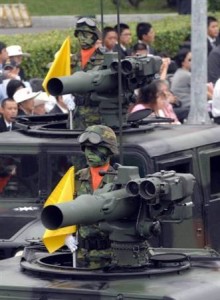 Additionally, the Obama Administration has not acquiesced to Taiwan’s request for F-16s. During the George W. Bush Administration, Taiwan repeatedly requested the purchase of F-16s. Similarly, Taiwan put out feelers with the Obama Administration to see if there was a possibility that they could purchase F-16s. Again, Taiwan was told not to put in a formal request for F-16s.
Additionally, the Obama Administration has not acquiesced to Taiwan’s request for F-16s. During the George W. Bush Administration, Taiwan repeatedly requested the purchase of F-16s. Similarly, Taiwan put out feelers with the Obama Administration to see if there was a possibility that they could purchase F-16s. Again, Taiwan was told not to put in a formal request for F-16s.
The F-16s are a big issue since they are not “defensive” arms; Beijing would very much view a sale of F-16s to Taiwan as going a bit too far. But Obama’s package to Taiwan merely includes the usual: Patriot missiles, Black Hawk helicopters, mine-hunting ships and information technology.
If the Obama Administration wanted to use the Taiwan arms sales requirement to “toughen” its stance to Beijing as the New York Times claims it has, the Administration would have acquiesced to Taiwan’s request for F-16s. Instead, it merely sold similar arms to Taiwan that President George W. Bush sold in 2008.
This is not to say that the Obama Administration does not have a strong China policy. Secretary of State Hillary Clinton’s recent policy speech on internet freedom was a robust critique of countries like China that censor their internet and partake in cyberhacking. This follows President Obama’s strong and public criticism of internet censorship while in China this past November. The New York Times would have done better to focus its argument on the Administration’s novel and forceful rhetoric on internet freedom vis-à-vis China.
 On Facebook
On Facebook By Email
By Email 